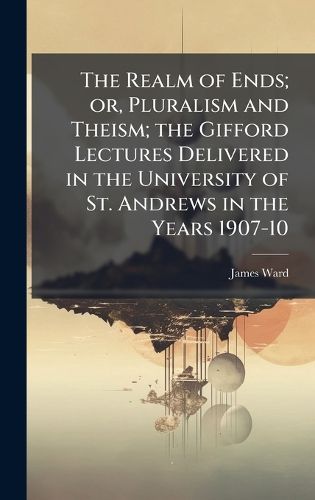Readings Newsletter
Become a Readings Member to make your shopping experience even easier.
Sign in or sign up for free!
You’re not far away from qualifying for FREE standard shipping within Australia
You’ve qualified for FREE standard shipping within Australia
The cart is loading…






This title is printed to order. This book may have been self-published. If so, we cannot guarantee the quality of the content. In the main most books will have gone through the editing process however some may not. We therefore suggest that you be aware of this before ordering this book. If in doubt check either the author or publisher’s details as we are unable to accept any returns unless they are faulty. Please contact us if you have any questions.
The Realm of Ends; or, Pluralism and Theism presents James Ward's Gifford Lectures, delivered at the University of St. Andrews between 1907 and 1910. Ward, a prominent philosopher and psychologist, explores the intricate relationship between pluralism and theism, offering a profound examination of metaphysics and religious philosophy.
In this intellectually stimulating work, Ward delves into the concept of the 'Realm of Ends, ' investigating the nature of reality, the existence of God, and the interaction of individual entities within a unified whole. Through rigorous analysis and insightful arguments, he navigates complex philosophical terrain, challenging traditional views and proposing innovative perspectives. This book remains a valuable resource for scholars and anyone interested in the intersection of philosophy and religious thought.
This work has been selected by scholars as being culturally important, and is part of the knowledge base of civilization as we know it. This work was reproduced from the original artifact, and remains as true to the original work as possible. Therefore, you will see the original copyright references, library stamps (as most of these works have been housed in our most important libraries around the world), and other notations in the work.
This work is in the public domain in the United States of America, and possibly other nations. Within the United States, you may freely copy and distribute this work, as no entity (individual or corporate) has a copyright on the body of the work.
As a reproduction of a historical artifact, this work may contain missing or blurred pages, poor pictures, errant marks, etc. Scholars believe, and we concur, that this work is important enough to be preserved, reproduced, and made generally available to the public. We appreciate your support of the preservation process, and thank you for being an important part of keeping this knowledge alive and relevant.
$9.00 standard shipping within Australia
FREE standard shipping within Australia for orders over $100.00
Express & International shipping calculated at checkout
This title is printed to order. This book may have been self-published. If so, we cannot guarantee the quality of the content. In the main most books will have gone through the editing process however some may not. We therefore suggest that you be aware of this before ordering this book. If in doubt check either the author or publisher’s details as we are unable to accept any returns unless they are faulty. Please contact us if you have any questions.
The Realm of Ends; or, Pluralism and Theism presents James Ward's Gifford Lectures, delivered at the University of St. Andrews between 1907 and 1910. Ward, a prominent philosopher and psychologist, explores the intricate relationship between pluralism and theism, offering a profound examination of metaphysics and religious philosophy.
In this intellectually stimulating work, Ward delves into the concept of the 'Realm of Ends, ' investigating the nature of reality, the existence of God, and the interaction of individual entities within a unified whole. Through rigorous analysis and insightful arguments, he navigates complex philosophical terrain, challenging traditional views and proposing innovative perspectives. This book remains a valuable resource for scholars and anyone interested in the intersection of philosophy and religious thought.
This work has been selected by scholars as being culturally important, and is part of the knowledge base of civilization as we know it. This work was reproduced from the original artifact, and remains as true to the original work as possible. Therefore, you will see the original copyright references, library stamps (as most of these works have been housed in our most important libraries around the world), and other notations in the work.
This work is in the public domain in the United States of America, and possibly other nations. Within the United States, you may freely copy and distribute this work, as no entity (individual or corporate) has a copyright on the body of the work.
As a reproduction of a historical artifact, this work may contain missing or blurred pages, poor pictures, errant marks, etc. Scholars believe, and we concur, that this work is important enough to be preserved, reproduced, and made generally available to the public. We appreciate your support of the preservation process, and thank you for being an important part of keeping this knowledge alive and relevant.